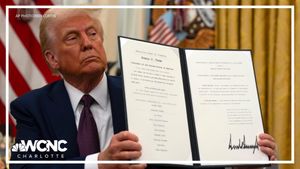A passenger plane collided with a military helicopter over the Potomac River, claiming the lives of 67 individuals, prompting severe backlash against President Donald Trump for his insensitive response during this devastating moment.
The tragedy unfolded shortly before Trump addressed reporters at the White House on January 31, 2025. During the briefing, he was asked whether he would visit the crash site to pay his respects, to which he responded sarcastically, "You want me to go swimming?" This patently inappropriate remark drew immediate criticism, with commentators and public figures expressing disbelief and condemning his lack of empathy.
Online reactions were swift and virulent, as users across various platforms lambasted the president. One social media user stated, “67 people die under his watch, and he makes a joke? Callous, heartless, completely lacking in empathy on full display.” Another commenter added, “Disgusting. Callous. Cruel. Completely unpresidential. There were kids on the flight! My God!” Such remarks reflected the outrage over Trump's dismissal of the tragedy.
Trump’s comments were compounded by his claim during the press conference about the causes of the crash. He publicly blamed the Biden administration and diversity-related policies for the incident's ramifications, stating, "Some really bad things happened, and some things happened and shouldn’t have happened." This assertion was met with fierce scrutiny as no official investigations had yet concluded on the crash's specific causes.
At the heart of Trump’s allegations was the assertion he made during the press conference, which echoed criticisms he has voiced before. He pointed to alleged hiring practices by the Federal Aviation Administration (FAA) under Biden's leadership, which he claimed encouraged the recruitment of individuals with significant disabilities. He suggested these hiring programs compromised aviation safety, declaring, "We want the most competent people, especially in those positions." Trump emphasized, “They have to be talented, naturally talented geniuses, and you can’t have regular people doing their job.”
Despite the lack of evidence supporting his claims concerning the FAA and diversity hires, Trump maintained this narrative during his remarks, positioning himself against what he described as the lower standards set by prior administrations. “Obama, Biden, and the Democrats put politics first,” he asserted, citing lowered requirements for air traffic controllers as part of his critique.
At the time of Trump’s statements, investigations were still pending to identify the precise factors leading to the crash. While noting the need for rigorous qualification for aviation personnel, the president focused more on his disdain for current diversity measures than on addressing the tragedy’s human toll.
The public’s response to Trump's comments reveals the heightened sensitivity surrounding aviation safety and the repercussions of such disasters. Critics emphasized the need for leaders to respond with compassion and clarity during crises, contrasting Trump’s approach with the tone traditionally expected from presidents during national tragedies.
Many observers noted the significant difference between Trump's remarks and those of other presidents in similar situations. For example, when reflecting on previous aviation disasters, former President Barack Obama reportedly offered solace and unified messages of mourning and support, drawing upon collective grief rather than turning to political posturing.
Following the recent crash over the Potomac River, the emphasis on both safety and empathy could not be more pronounced. More than 40 victims' bodies were reportedly recovered from the river, with investigators working diligently to understand the details of the crash.
The juxtaposition of Trump's sarcastic responses against the backdrop of such tragedy highlights larger conversations about leadership style and the responsibilities of public figures at times of communal grief. The reactions to Trump's comments mirrored broader conversations about governance, empathy, and the role of diversity within America’s institutions.
Trump’s handling of the situation set off alarms about the focus of his leadership approach—a mix of blame and insensitivity instead of unity and respect for those grieving. His method has sparked wider speculation about how future administrations might respond when unexpected disasters shake the nation.
While the investigation continues and the ramifications of the crash are still being analyzed, the immediate aftermath highlights the importance of how leaders articulate their responses when addressing the public at moments of distress, showcasing both the need for facts and the imperative of compassion.



